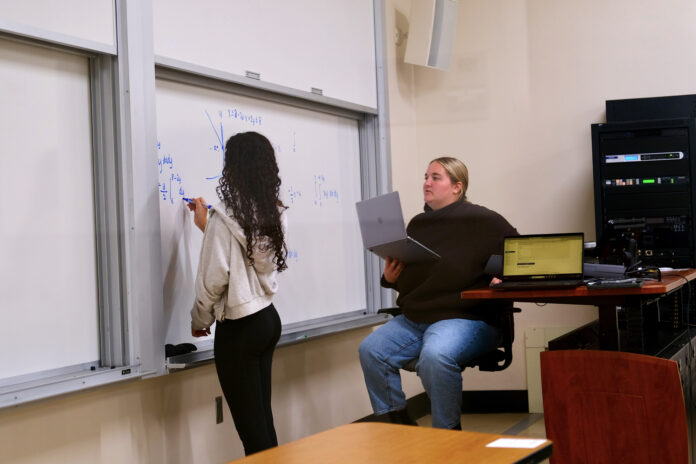Students and teacher assistants offer insight into useful resources for incoming Aggies
By LORENA ALVAREZ — arts@theaggie.org
While many incoming students were initially drawn to UC Davis’ tranquil and alluring campus, the transition into a quarter system, composed of three ten-week quarters, can be difficult. This is especially true for students who are unaware of the abundant resources available to them.
Melina Rodriguez, an associate instructor for first-year English composition and previous ENL 10B, 113A and 117 teacher assistant (TA) noted a TA’s role in a student’s academic experience.
“[Being a teacher assistant is] about being accessible to help navigate and understand the material a bit more when the professor might not be able to really meet with [students] and give them as much one-on-one time or understanding of a lot of things,” Rodriguez said. “Because of the shortness of a lecture, time is really not in our favor sometimes, especially with the quarter system. So I think the TA is there to help supplement and support that learning process.”
Rodriguez went on to comment on some helpful tips she has for balancing workloads, especially readings.
“My biggest thing is also pacing yourself with the reading load — not overwhelming yourself thinking that you have to fully 100% understand every word in a chunk of something because you’re never going to get through everything if you’re freaked out about every single [word],” Rodriguez said.
They continued by stressing that understanding the initial reading doesn’t determine a student’s success in the class.
“I think the idea is that in class, as time goes on, you’ll be able to understand it more and more,” Rodriguez said. “So that first read-through is less important and less of a time commitment.”
They also noted some advice they have for humanity students struggling to understand where their writing has failed to meet their professors’ expectations and how they can meet them going forward.
“Go directly to the professor, not just the TA to really clear up your anxieties around [grading]. And if that doesn’t end up helping, then I would say really pay attention to what kinds of things they are mentioning in class,” Rodriguez said. “What kinds of things are they drawing attention to in their feedback on your papers? And if these are all things that you’re not quite sure about yet, then I would say to focus on the big components of what usually go into English papers, like the argument itself [and] the use of evidence. If all of that seems to be working out, then it’s probably [more about] focusing on clarity.”
Rodriguez went on to note the resources available to help students through the writing process.
“Writing is something that people assume you’re either good at or you’re not, but it’s really a very steady learning curve,” Rodriguez said. “[A helpful resource available to all students is] the Writing Center. The people there are always willing to help. TAs and professors are usually more open to explaining things more thoroughly than you might think,” Rodriguez said.
When asked what advice they would give first-years, Nathalie Moriarty, a fourth-year Ph.D. developmental psychology student and TA for developmental courses commented on time management, echoing a theme in the path to a successful quarter.
“The best way to manage your coursework is to pace yourself, have reasonable expectations and be consistent. Cramming and dumping is not sustainable, especially in a ten-week quarter. Take hybrid courses if you can, because they are often well-paced and highly structured. Check Canvas often and plan assignment/study time intentionally and in advance,” Nathalie, who prefers to go by their first name, noted.
They also commented on the sudden emergence into the unknown territory of campus and adulthood that many first-year students experience, noting all the resources readily available to them.
“This is their first taste of adulthood, and it’s in a college town where a huge proportion of the population is young people like them. Make friends with your roommates and classmates and get involved in other social events. Get to know your community advisors, TAs, professors and anyone else who might have advice for you,” Nathalie said. “Whatever your need is, there is a way to have it met — like [The Pantry], financial loans, resource sharing and many more.”.
They went on to note the importance of being active participants even when there is change and uncertainty.
“Embrace the changes, try new things, have fun — but don’t forget why you’re here,” Nathalie said. “So much of classroom success is dependent on a genuine motivation to learn and succeed. College will be much more difficult if you don’t participate actively in your own education.”
Shifting from academic advice, Jasmine Le, a third-year psychology major, commented on advice she has for living independently with other college students.
“Take your time to figure out your priorities,” Le said. “It’s easy to get caught up in staying afloat at times, so it’s always nice to have general plans in mind to guide you through your day-to-day.
Le recommended practicing “clear communication with roommates” and “[bringing] things up kindly to avoid fighting over little things.”
Entering a quarter system and transitioning into the unfamiliarity that comes with college can easily become overwhelming, but don’t worry: you’re not going through it alone.
Written by: Lorena Alvarez— arts@theaggie.org










